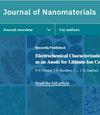Fabrication and Experimental Estimation of Mechanical Properties of Kevlar-Glass/Epoxy Interwoven Composite Laminate
4区 材料科学
Q2 Materials Science
引用次数: 0
Abstract
Hybrid composites made of natural and synthetic fibers are stronger, lighter, cheaper, biodegradable, and greener than conventional metals, and they are replacing conventional metals. The primary objective of the study was to examine the mechanical properties of interwoven hybrid composite laminates. Kevlar and glass fiber are used as reinforcement for this work. The fibers are woven together using various weaving techniques. 1 × 1, 3 × 3, and 5 × 5 weaving patterns are considered to explore the properties of the laminates. The composites are woven using a conventional handloom method. As a matrix, LY556 resin and HY951 hardener are combined at a ratio of 10 : 1. The composites are cured using compression molding. The cured composites are assessed for their tensile strength, flexural strength, compressive strength, interlaminar shear strength, impact strength, and fracture toughness. The highest tensile, compressive, and flexural strength were found in the 1 × 1 pattern, shear strength and fracture toughness were found in the 5 × 5 pattern, which finds applications in aerospace and defense sectors, and 3 × 3 dominated in impact strength; as a result, it can be used in bulletproof applications. At last, a scanning electron microscope (SEM) was used to visualize the matrix-reinforcement bonding. The microscopic images show the ripped-out fibers because of the tensile test. The shards in SEM are evident that impact force breaks the matrix elements in a brittle manner.芳纶-玻璃/环氧交织复合层压板的制备及力学性能的实验评价
由天然纤维和合成纤维制成的混合复合材料比传统金属更坚固、更轻、更便宜、可生物降解、更环保,它们正在取代传统金属。研究的主要目的是研究交织复合材料层合板的力学性能。凯夫拉和玻璃纤维被用作这项工作的增强材料。这些纤维是用各种编织技术编织在一起的。采用1 × 1、3 × 3和5 × 5织造模式,探讨复合材料的性能。复合材料是用传统的手摇织机方法编织的。作为基体,LY556树脂和HY951硬化剂以10:1的比例组合。复合材料采用压缩成型固化。固化复合材料的拉伸强度,弯曲强度,抗压强度,层间剪切强度,冲击强度和断裂韧性进行评估。抗拉、抗压和抗折强度以1 × 1模式最高,抗剪强度和断裂韧性以5 × 5模式最高,主要应用于航空航天和国防领域,冲击强度以3 × 3模式为主;因此,它可以用于防弹应用。最后,利用扫描电子显微镜(SEM)观察了基体与增强材料的结合过程。显微图像显示由于拉伸试验而撕裂的纤维。从SEM中可以明显看出,冲击力使基体元素发生脆性断裂。
本文章由计算机程序翻译,如有差异,请以英文原文为准。
求助全文
约1分钟内获得全文
求助全文
来源期刊

Journal of Nanomaterials
工程技术-材料科学:综合
CiteScore
6.10
自引率
0.00%
发文量
577
审稿时长
2.3 months
期刊介绍:
The overall aim of the Journal of Nanomaterials is to bring science and applications together on nanoscale and nanostructured materials with emphasis on synthesis, processing, characterization, and applications of materials containing true nanosize dimensions or nanostructures that enable novel/enhanced properties or functions. It is directed at both academic researchers and practicing engineers. Journal of Nanomaterials will highlight the continued growth and new challenges in nanomaterials science, engineering, and nanotechnology, both for application development and for basic research.
 求助内容:
求助内容: 应助结果提醒方式:
应助结果提醒方式:


